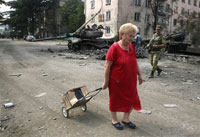EU to send monitoring mission to Georgia
France sought support Wednesday from its European Union partners for an EU monitoring mission in Georgia to firm up the shaky cease-fire between Russia and Georgia.

"It's a good idea," said French Foreign Minister Bernard Kouchner as he arrived to chair an emergency EU meeting. "The presence of controllers ... monitors, European facilitators, yes, yes and yes, that's how Europe should do it on the ground."
French President Nicolas Sarkozy, who brokered a cease-fire in Georgia on Tuesday, said then that the EU could send peacekeepers to Georgia if all parties agreed to the plan.
Georgia's foreign minister made an impassioned appeal for the Europeans to send a mission, claiming that Russia was violating the cease-fire with a renewed attack on the strategic city of Gori.
"European monitors have to be on the ground," said Eka Tkeshelashvili. "Europe has to get engaged physically on the ground and Europe has to stop that from happening. We are part of Europe and part of Europe is being aggressed now."
Tkeshelashvili spoke to reporters as she arrived for talks with EU officials.
Russia denied Wednesday that Russian tanks entered Gori, but did acknowledge some Russian soldiers went into the Georgian city. Gori is near the breakaway province of South Ossetia, which has been the epicenter of fighting in the past week.
Russia describes its own troops in the breakaway Georgian regions of South Ossetia and Abkazia as peacekeepers and has been wary of previous suggestions to replace them with European or other international forces.
However, Kouchner said the Russians would accept a European monitoring mission, although he avoided using the term peacekeeping troops to describe a possible EU role.
Poland backed the idea of an international mission to replace Russian troops and immediately offered to participate.
"I think international forces would be more credible," said Polish Foreign Minister Radek Sikorski. "If such a force were put together, Poland would contribute."
Kouchner said an EU mission could help ensure a lasting disengagement of forces under the EU cease-fire plan that Sarkozy put to the leaders of Russia and Georgia.
British Foreign Secretary David Miliband agreed that the EU should "stand ready" to take on a peacekeeping role and make sure that humanitarian aid is rushed to the thousands of people made homeless by the conflict.
Sarkozy's cease-fire plan calls for Russian and Georgian forces to move back to their positions before the heavy fighting broke out Aug. 7.
The conflict has opened up a rift within the 27-nation EU. Former East bloc nations such as Poland and Latvia have urged a hard line against Russia, while older EU members such as Italy and Germany have taken a more conciliatory approach.
Miliband said EU foreign ministers would have to decide at their next meeting, in September, how to proceed with negotiations on a major cooperation agreement with Russia. "The European Union will want to consider how it proceeds with the partnership and cooperation agreement," he told reporters.
Georgia has asked the EU to freeze its "strategic partnership" talks with Russia, but Europe's room for maneuver is limited by the dependence of many EU members on Russian oil and gas imports.
Subscribe to Pravda.Ru Telegram channel, Facebook, RSS!


